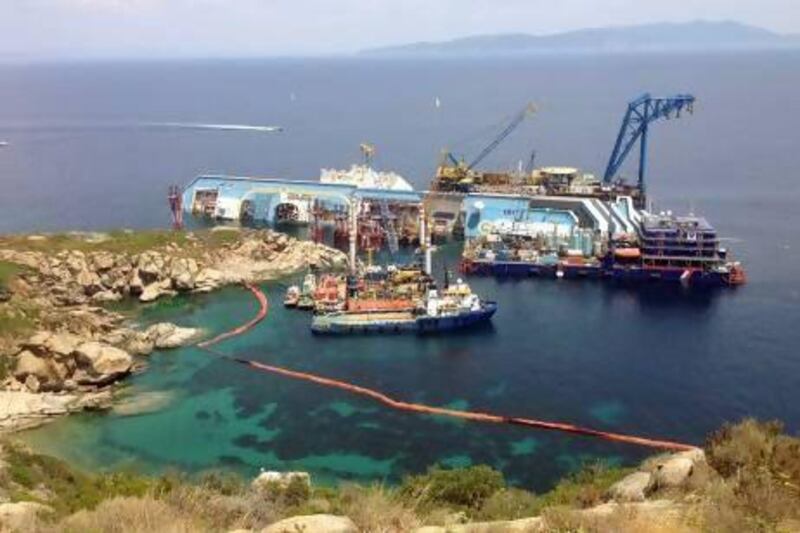GROSSETO, Italy // The crippled Costa Concordia still lies off the tiny Tuscan island of Giglio, a stubborn reminder of last year's shipwreck that claimed 32 lives.
Yesterday, the luxury cruise liner's captain went on trial as the sole defendant in a case that may take months or longer to resolve - making an end to the drama even more elusive.
Francesco Schettino is charged with manslaughter, abandoning ship and causing the shipwreck.
He took his place at the defendant table at the edge of the orchestra pit in Grosseto's Teatro Moderno, a 1,000-seat theatre that is serving as a more spacious substitute for the courtroom of this Tuscan provincial capital because so many survivors and victims' relatives were expected to attend.
Instead, aside from journalists and a panel of judges, at a table on the stage, the theatre was virtually empty. A nationwide, eight-day lawyers' strike had generated wide expectations that the judge, Giovanni Puliatti, would immediately adjourn the opening hearing. It did not quite happen that way: Mr Puliatti intoned a nearly hour-long roll call of lawyers' names before calling it a day - setting the next session for July 17.
It was the latest example of Italy's slow-moving justice system. But what has riled survivors even more is the lack of any other defendants in the trial, frustrating hopes of learning why the sophisticated ship struck the reef, and why everyone was not safely evacuated.
One of the lawyers representing survivors, Daniele Bocciolini, said what his clients wanted was simple: "We are asking for justice," he said.
Mr Schettino "is the only defendant, but he is not the only one responsible", said Mr Bocciolini. "There is still a need to shed light on what happened."
Court-appointed experts have concluded that the crew and the owner, Costa Crociere SpA, committed blunders and safety breaches that contributed to the disaster.
Five other defendants successfully sought plea bargains, and their hearing will be held in Grosseto on July 20. Their sentences are expected to be much more lenient than the 20 years in prison Mr Schettino might face if convicted.
Prosecutors contend that Mr Schettino steered the ship too close to the island's coastline in a publicity stunt for Costa Crociere. The cruise company has denied that version of events.
Survivors described a chaotic and delayed evacuation, with crew allegedly at first downplaying the seriousness of the collision, which caused a gash 70 metres long in the Costa Concordia's side and let seawater fill much of the vessel.
The wait for justice will be long, with sheer legal logistics dragging the trial out.
Mr Schettino's lawyer, Domenico Pepe, said that some 1,000 witnesses would be called to testify. That phase of the trial alone could take weeks.
Many of the witnesses will be drawn from the 4,200 passengers and crew aboard the ship that struck the reef on the night of January 13, last year, rapidly took on water and capsized, leaving many of the lifeboats unable to be lowered into the sea.
Dozens of people had to be plucked to safety by helicopters, while others jumped off the badly tilting ship into the sea and swam to Giglio's rocky shores. Survivors were stunned to see Mr Schettino already on shore when, exhausted, they struggled on to land.
Remains of two of the dead have not been found.
For weeks, divers dodged floating mattresses, tableware, chairs and other furnishings of the Costa Concordia in their search of the interior as well as the exposed side of the boat.
They plumbed the nearby waters in vain search for the bodies of a middle-aged Italian woman, whose family said she was an excellent swimmer, and of an Indian man who worked as a waiter aboard.
Mr Schettino, wearing sunglasses and slipping on a blue jacket over his white shirt, made no comment as he hurried into a back entrance of the theatre. On his way out, before darting into a car, he told reporters: "We'll see you on the 17th."
Mr Schettino has described himself as a scapegoat. Far from being a coward, he said, he was a hero for steering the ship closer to Giglio's port after the collision - a manoeuvre he claimed helped save countless lives by making rescue easier.
The public's idea of him contrasts sharply. It is largely shaped by an often-broadcast recording of a phone conversation between Mr Schettino and an exasperated Italian coastguard official who repeatedly ordered the captain to scramble back aboard the ship to direct the evacuation.






